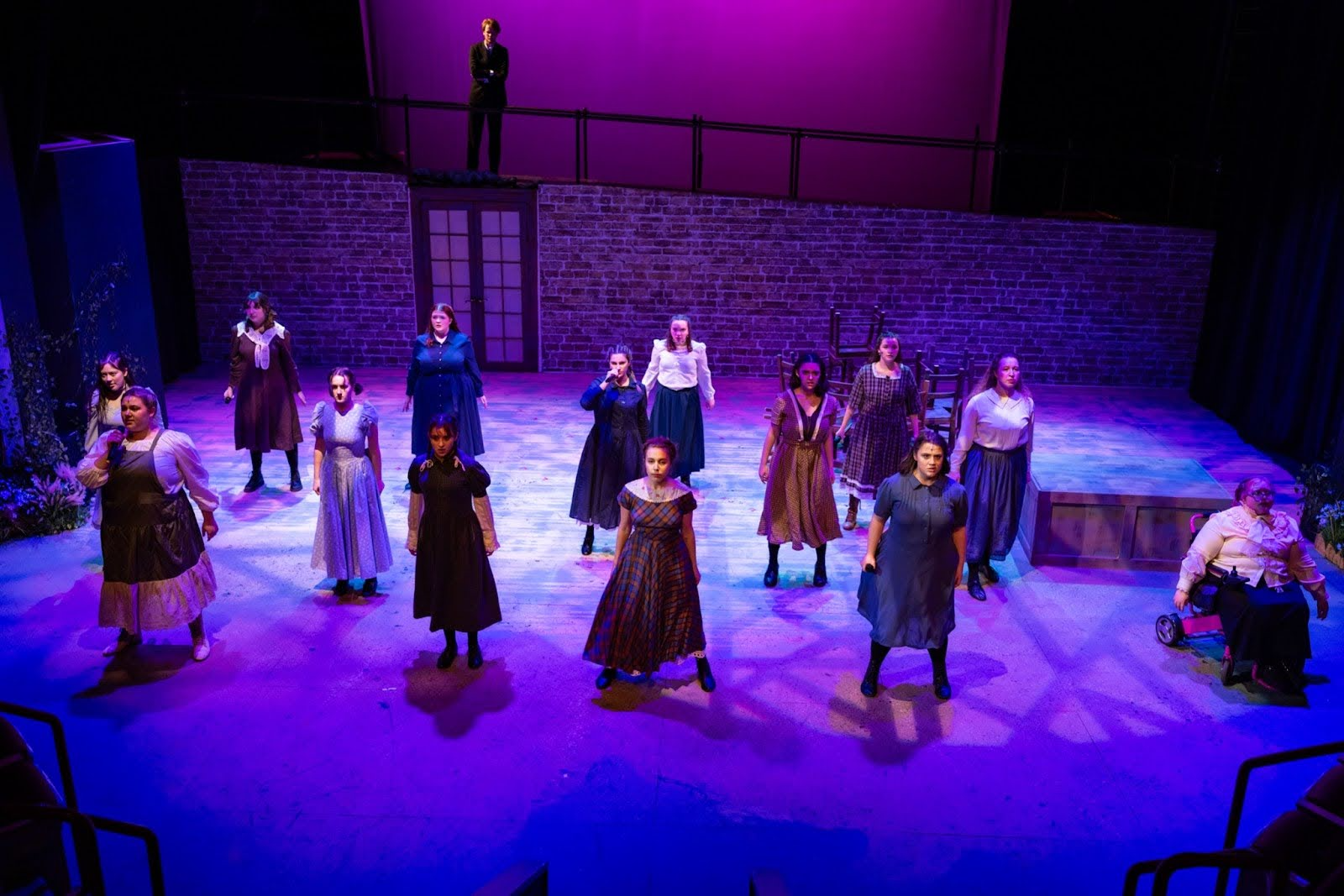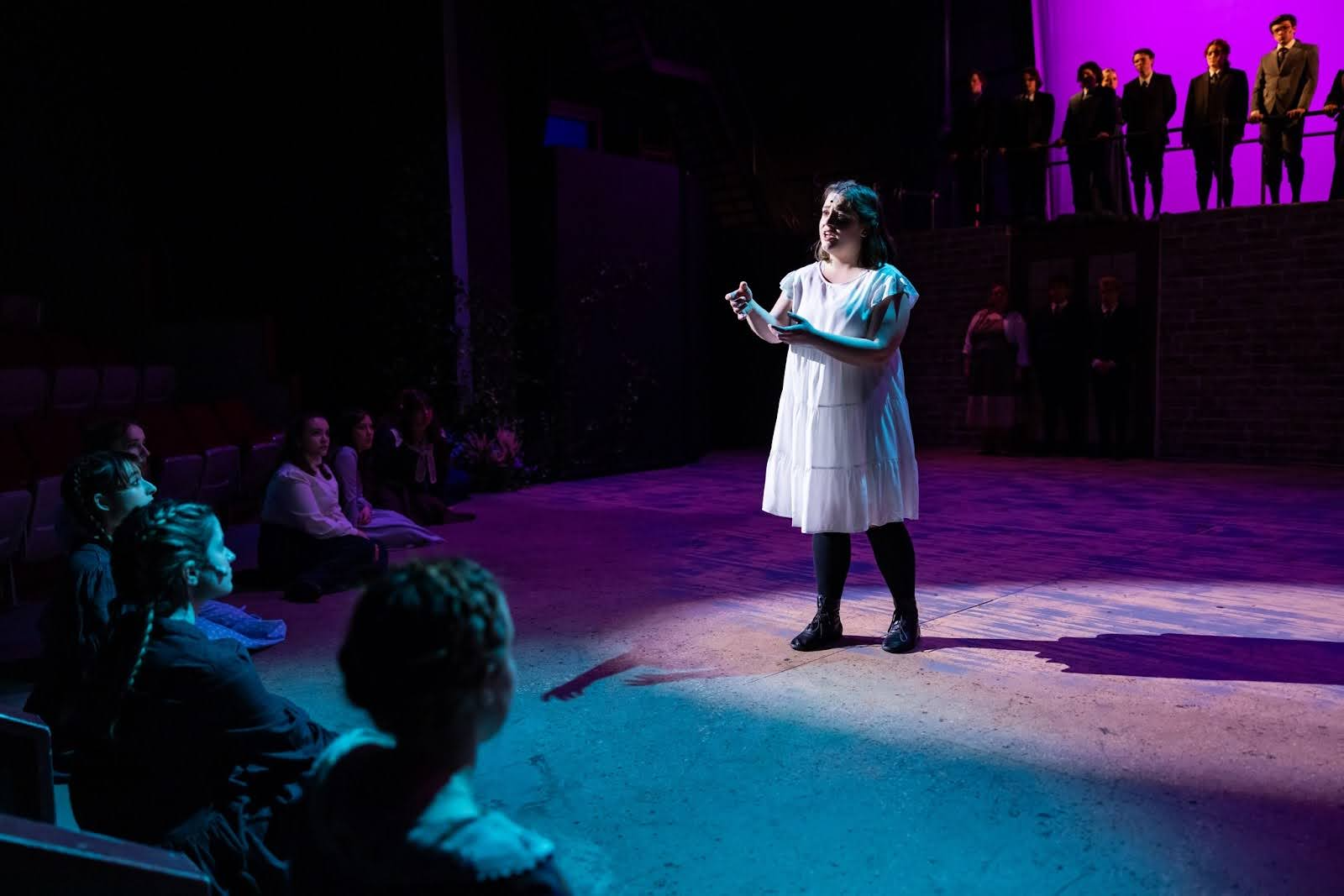A Review of Spring Awakening
Senya Scott ‘26



Photos courtesy of Danny Bristoll or @dannybristollphoto.
Sarah Lawrence students, in knee-high socks with rockstar voices, took to the stage in this semester’s mainstage musical “Spring Awakening", directed by Lauren Reinhard. The production opened on Thursday, Feb. 29, and took the campus by storm.
The original play, written in 1891 by German playwright Frank Wedekind, was then adapted into a musical by Dunkan Sheik and Steven Sater in 2006. Spring Awakening is known for its controversial depictions of adolescence and violence. The musical, historically, excels in making the difficult corners of teenage life visible and important, and Sarah Lawrence's production is no exception.
The show begins with a young Wendla Bergman who longs to understand sex and intimacy in a world that refuses to give her any answers. Wendla becomes romantically involved with the free-thinking school boy, Melchior Gabor. While Wendla suffers from a lack of knowledge, Melchior constantly puts his knowledge on display. This imbalance in their connection keeps both of them from making the right decisions in their relationship with one another. Their song, “The Word of Your Body,” is used to paint their brooding romantic feelings and desires. They explore this intimacy with one another with little to no guidance on how to navigate or understand it.
The lead roles of Wendla and Melchior were played by cast members Violet Webster ‘25, and Gil Dominiguez-Letillier ‘24 respectively. Audiences could only feel respect for both of them as actors while watching them act out intimate and sensitive scenes with one another. The production did a good job at making the young people a product of their environment. “I think a lot of productions go [in] this direction of saying that Wendla is just this pure, innocent little girl. She’s just curious about the world. She’s innocent because she’s never been told anything,” said Webster.
The play expands beyond its main characters, diving into the lives of the other school children. Wendla watches as her friend Martha (played by Skylar Crown ‘25), experiences physical and emotional abuse at the hand of her father. Crown’s performance of “The Dark I Know Well” was one of the most powerful vocal performances of the entire production. There was an unfiltered pain one could feel through the music. It also helped in shifting the main narrative of the plot to one that was darker and more mature.
Simultaneously, Melchior does what he can to support his friend Moritz who anxiously struggles with new erotic dreams that haunt him every night, ultimately leading to his academic failure.
Simon Diesenhaus ‘24 did an outstanding job portraying the character of Moritz. His character’s struggles were so internal, yet so visible in every single scene he appeared in. There was a smoothness in the way he slipped from an anxious mess of a boy to a frustrated kid, ready to bust at the seams.
The decision to have him sing with a mic stand instead of the hand-held microphone was initially hard to grasp. By the time Diesenhaus began to sing his performance of “I Don’t Do Sadness”, the grittiness in his voice immediately made the song come to life. It was as if all of those feelings that he had piled up were just completely pushed over. This musical number was an emotional release, and the mic stand gave it a front stage, dramatic moment that it needed.
It was clear that there was a lot of time put into developing the character Moritz. “I wanted to sit with the piece itself. It’s not a very typical musical theatre experience,” Diesenhaus said. “There was the challenge of this role dealing with depression and suicidal ideation which are things that come up more in modern life than we want them to,” he continued. “It’s been a lot of work with Lauren [Reinhard], my understudy, the cast, and myself in figuring out how to do that responsibly. I need to tell that story and it’s hard.”
There was a significant amount of attention put towards making sure the power dynamics were obvious between the children and the adults of the play. The decision to have every adult character played by the same two cast members was very striking to me. It felt as though the adult figures were meant to blend from scene to scene, making each adult’s presence feel almost exactly like the one before. By doing this, audience members were dropped into this young perspective, where the adults in their lives became these faceless authority figures amid their struggles. These children are left to hold one another’s hands as they walk through the most confusing times of their lives with no one to guide them.
The supporting characters were the beating heart of the performance. Each one of them showed up with a strong stage presence in every scene. Anya Ernst ‘24, played the character Théa, a friend of Wendla’s. She performed in the songs, “Mama Who Bore Me (Reprise)” and “My Junk”. “What’s great about this play is it touches on everything you don’t want to talk about. For a play that was written in the 1800s, it’s ahead of its time. But that’s why it’s so impactful. It holds up to this day. There was a sense of unbreakable community on and off the stage and it showed up in every scene,” she said. “I love Lauren [Reinhard],” Ernst continued, “I think it’s a really difficult play and she’s handled it with a lot of grace.”
Reinhard orchestrated the performance wonderfully. The show itself didn’t drag on for too long, and each scene felt like it was given the appropriate amount of time to rest on the stage before going into the next one. Amid all the chaos between characters, there was still an organization in their direction that made each event flow. There wasn’t the content whiplash that often comes out of productions with such heavy subject matter. It was clear that Reinhard intended to approach topics in the show with utmost sensitivity. There were many homages paid to original productions of “Spring Awakening”, but the characters felt like they belonged to the actors who played them. There was an unmistakable authenticity in that.
The representation of adolescent trauma and pain resonated with the college students, and that was the emotional underbelly of the experience. It was performed for the perfect audience. Each character voiced a generation of young people, struggling to find their way in a world that wasn’t ever ready to let them grow.
